
01 Mar Local Prosecutors & Law Enforcement Enhance Civics Education in New School District-Based Youth Court
Jurupa Valley–The Jurupa Valley Unified School District (JUSD) in collaboration with the Riverside District Attorney’s Office, Riverside Sheriff Department, Women Wonder Writersand Reach-Out operate the JUSD Student Court bi-monthly at the School District’s Board Room. The idea took root last year in an effort to curb school-based offenses and delinquency incidents, such as marijuana use, chronic truancy, and disrupting the school and learning environment. When JUSD Director of Administrative Services Ilsa Garza-Gonzalez approached Debra Postil, a community prosecutor and member of the steering committees of the Riverside Police Department Youth Court, Coachella Valley Youth Court Collaborative, and California Association of Youth Court, Ms. Postil welcomed the opportunity to start a student court to serve middle and high school students in Jurupa Valley. The District collaborated with the Sheriff’s Department, District Attorney’s Office and local nonprofits to help set up the student court, which runs bi-weekly on Saturdays at the Jurupa Unified School District.
Having regularly presiding as a judge over the JUSD Student Court, Senior Deputy District Attorney and Superior Court Judicial Candidate Burke Strunsky, who is also the author of the book The Humanity of Justice, named after his charitable foundation The Humanity of Justice Foundation, which strives to root out child abuse across the nation, “To me, being in a public service profession means that one has a heightened responsibility to be involved in the community. What I particularly like about Student Court is that-although I act as a judge-it is the youth juries who ask the probing questions to their contemporary who is accused of some type of misconduct. I believe that hearing relevant questions and suggestions from young people, who are at the same place in life as the accused, have a far deeper impact than the same coming from any adult. So, there is a two-way process in which the youth questioners and the accused youth feed off of each other and both come out stronger because they are more understanding of the particular problem. Eventually, this leads to a broader perspective on the underlying factors that can make a young person go off track and the consequences of not correcting that negative behavior. But I believe that the true genius of Student Court is making part of any disposition the requirement that the youth come back and serve on future juries involving other young people accused of misconduct. This empowers the former accused youths by allowing them to see a person in a similar situation to them and formulate a disposition that gets his or her colleague back on track.”
Ms. Postil confirmed that youthful offenders are required to come back to serve as jurors as a part of their sentence to, “give them a chance to help others, connect with a caring community, encourage them to play more positive roles in their communities, and expose them to pro-social peer influences, which is ideal in effective restorative justice programs.” School-based incidents are referred by school administrators and hearings are held from twice monthly in the formal education board room at the School District. Other students volunteer to serve as jurors, clerks, and bailiffs, including from the local Sheriff’s Explorer program. The jury, that is made up of middle and high schoolers, decide the sentencing consequences for the youthful offenders who come to court already admitting their guilt. Sentences have included community service, apology letters, counseling, tutoring, essays, and curfew restrictions.
Aside from hearing actual cases, according to Ms. Postil, the students receive a variety of training and educational programming, which is coordinated by Riverside-based nonprofit Women Wonder Writers and San Bernardino-based nonprofit Reach Out. At the beginning of the school year, all students received training about the history of youth courts, juvenile law, empathy, and social and emotional issues surrounding juvenile delinquency and truancy. On December 2nd, the students attended the Youth Track of Beyond the Bench, a multidisciplinary statewide conference devoted to children, youth, and families in the California court system. Last Saturday, the students received specialized training regarding appropriate internet, texting and social media behaviors and the consequences of cyberbullying by Riverside Police Officer Ryan Railsback.
In truancy cases, the youth jurors have imposed reverse curfews, requiring students to leave home in the morning to get to school. It is well known that truancy and dropout rates not only have a long term impact on crime rates, there is also an immediate and significant detrimental economic impact to our local school districts. According to the California Department of Education Data Reporting Office’s latest truancy figures (2013-14), Riverside County’s truancy rate is 33.15%. This is higher than the state average of 31.14%. According to the Attorney General’s 2014 Report on California Elementary School Truancy & Absenteeism Crisis, Riverside County’s truancy rate equated to a substantial loss of $96,833,125.00 to Riverside County school districts. According to Ms. Postil, the types of first time or low level offenses mostly engaged in by Riverside County Youth involve offenses related to property (22.1%), violence (20.2%), drugs and alcohol (12.7%) and truancy (14.7%). According to a Vanderbilt study directed by Professor Mark A. Cohen, each teen prevented from adopting a life of crime (including future adult offenses) can save public expenditures between $1.7 million and $2.3 million per youth. In the short term, each youth deterred from incarceration in California saves the government approximately $180,000 per child in annual incarceration costs according to the state’s Legislative Analyst’s Office.
According to the California Judicial Council’s Administrative Office of the Courts, studies show that youth court participation helps juvenile offenders be held accountable, an effective youth court can impose a consequence in a more timely fashion than a traditional juvenile court, can help build community connection, teens respond better to peers than adult authority figures, and can prevent future delinquent acts by empowering and educating youth. The national body of literature on youth courts recognize that these programs promote restorative justice, youth leadership and civics education as the students are having a real-life interaction with criminal justice professionals.
The student feedback demonstrates the value of civic learning. For example, Director of Administrative Services Ilsa Garcia-Gonzalez stated, “I had a few students talk to me and they were very excited to have had the opportunity to ask Deputy DA Burke Strunsky questions. One student even requested we continue to bring professionals from the legal community to speak to them because at schools they only get to hear from college representatives. I believe Mr. Strunsky inspired more than one to follow in his footsteps.”
To date, the Jurupa Unified Student Court has presided over 29 cases. Over 40 youth volunteers show up bi-weekly to participate. The next Student Court is set for March 5, 2016 where Senior Deputy District Attorney Burke Strunsky will act as a judge alongside the youth jury. The program will conclude Saturday, May 21st with an Awards Banquet in Jurupa Valley. Sponsorships and donations are being sought for the Banquet and for students to attend the 2016 CAYC Youth Court Summit being held on June 23-25 at UC Santa Cruz. For more information, questions, donations, or sponsorship opportunities for the JUSD Student Court, contact Kathy Ediss at (951) 532-3280 or Kathy@WomenWonderWriters.com.
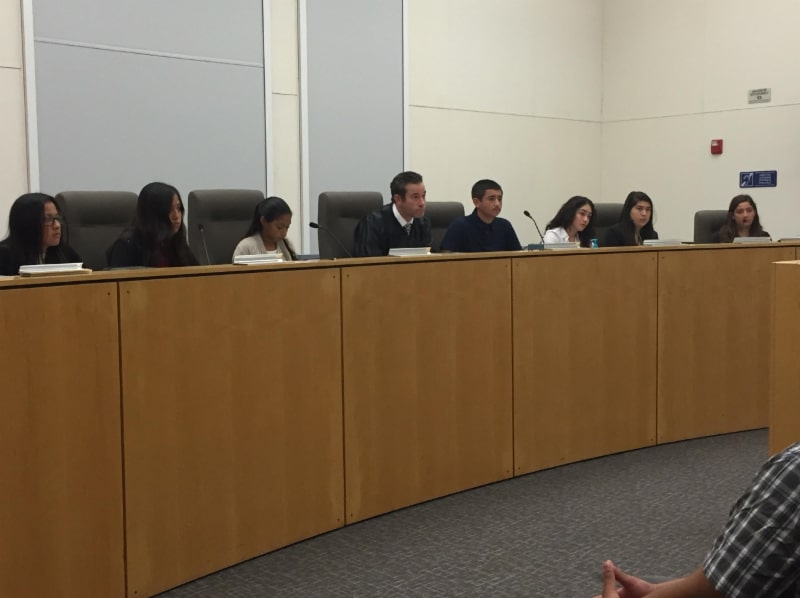
|
Senior Deputy District Attorney Burke Strunksy with Student Court Participants.
|
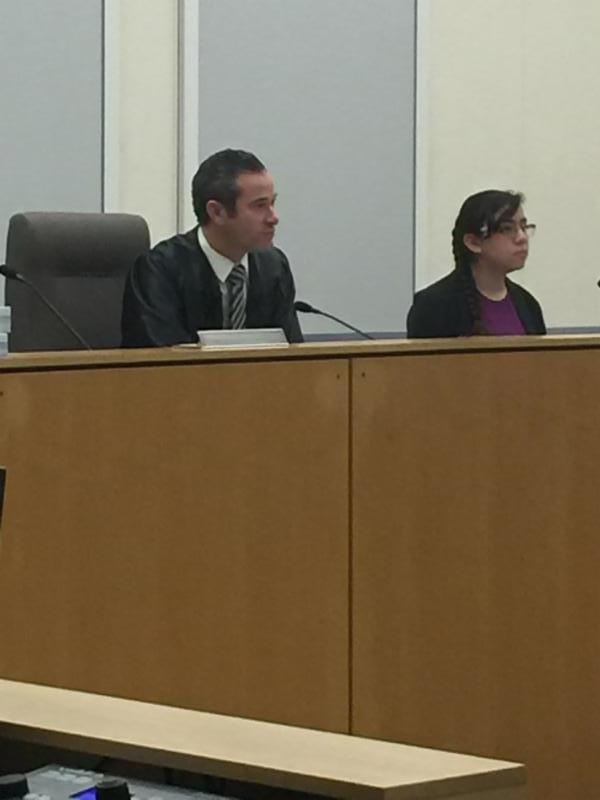
|
Senior Deputy District Attorney Burke Strunksy with Student Court Participant.
|
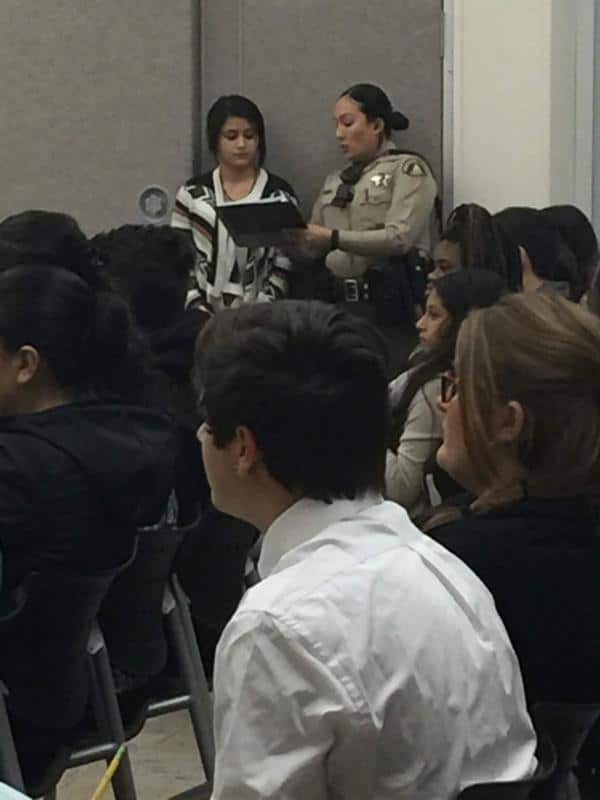
|
Riverside Sheriff Department Deputy with Student Court Participant.
|
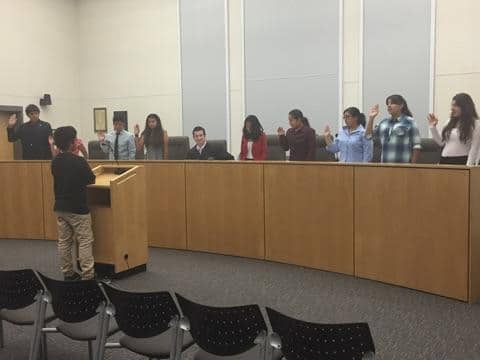
|
Deputy District Attorney Matthew Strickroth with Student Court Participants.
|
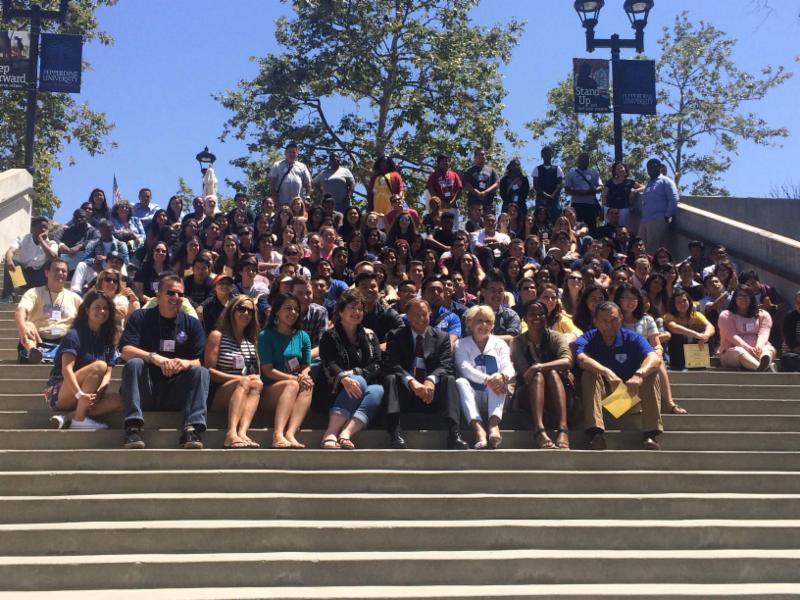
|
2015 California Association of Youth Court Summit, Pepperdine University
|


